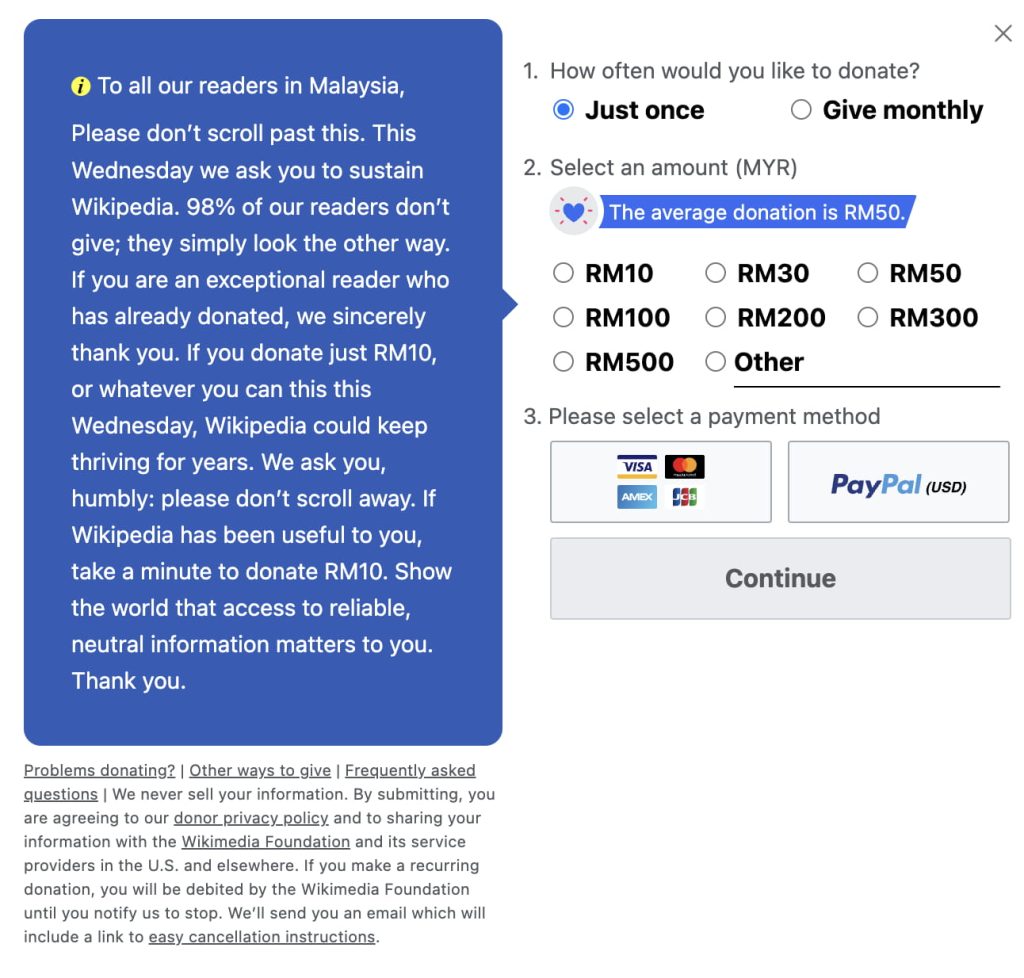On Wednesday, I joined two-percent club. I loaded a Wikipedia page like I had done every other day and was hit with the following message:

To all our readers in Malaysia,
Please don’t scroll past this. This Wednesday we ask you to sustain Wikipedia. 98% of our readers don’t give; they simply look the other way. If you are an exceptional reader who has already donated, we sincerely thank you. If you donate just RM10 or whatever you can this Wednesday, Wikipedia could keep thriving for years. We ask you, humbly: please don’t scroll away. If Wikipedia has been useful to you, take a minute to donate RM10. Show the world that access to reliable, neutral information matters to you.
Thank you.
It wasn’t a strange message. I had seen similar ones in the past and never had trouble ignoring them. However, this time it felt different. Maybe because it blocked the top portion of the page and I had to scroll down to read the article.
Or maybe because this time I noticed they said “readers in Malaysia”, which made it feel personal even though I knew it wasn’t. Whatever it was, it triggered something within me. It made me think about how often I used Wikipedia.
I use Wikipedia very often. When I’m learning about a new topic, it’s one of the first websites I visit. I love that they have such detailed entries on whatever I happen to look up, especially when it comes to music and bands.
I love tracing the history of my favorite musicians and finding out which bands or side projects they’ve been a part of, so I can check out more music from them. From those articles, I discover even more related musicians to listen to.
Sure, these days we have Spotify’s “fans also like” and their curated playlists, but they don’t give any context to why I should listen to them. I enjoy discovering the lore of musicians, why they leave or get kicked out, and their ties to other musicians.
I also like knowing the names of obscure bands and releases so I can hunt them down on Soulseek or YouTube. Spotify doesn’t have every song out there, unfortunately. Wikipedia makes sure I know that.
Beyond music, I’ve used it for looking up GPUs, countries, languages, comics, books, and everything under the sun. I know Wikipedia isn’t just one person. The site is great because its contributors do a fantastic job of filling up and updating the pages.
It’s not a reliable source for academia due to its editable nature, but I’m not using it for such purposes. All I want to do is grasp certain concepts quickly, or look at information compiled in neat tables. I click on external links when I want to find out more.
Easily editable is a double-edged sword: it means that it’ll be constantly updated, unlike encyclopedias. On the other hand, people can choose to fill pages with nonsense. Fortunately, attempts to vandalize articles are usually spotted and fixed very quickly.
Wikipedia isn’t as “rabbit-holey” as TV Tropes, which I’m glad because if it was, I’d never get anything done. Then again, it can already be quite a time sink in its current form but that might just be me and my curious nature.
After donating, nothing changed. I received a thank you email from Maryana, Wikimedia Foundation’s CEO and I resumed using the site as normal. I didn’t gain any extra perks which would have been a nice touch, but I guess that goes against the spirit of donations.
I guess it feels good knowing I’m doing something to keep one of my most-used websites afloat, even though it has been running for over twenty years will continue doing so without my help.
I’m sure I underpaid Wikipedia but that’s okay, other people can pick up the slack. What am I, Mr. Moneybags?

Leave a Reply